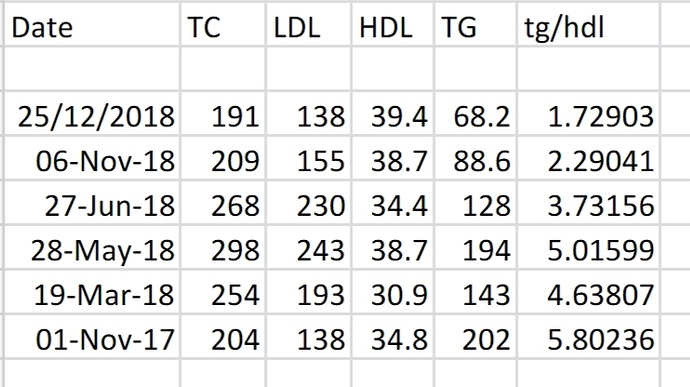Ha ha! Yes, of course. I’m a lifelong addict.
Great question. What I meant by not conclusive is that for me, as far as the science goes, I’d like to see a lot more randomized controlled trials showing that cafestol directly accounts for the kinds of cholesterol levels we’re seeing in our group.
Secondly, I don’t know how individualized this effect is. Is cafestol as potent for all individuals and in all nutritional approaches? I just don’t think we can know this just yet.
Four things come to mind regarding individualization:
- Brenda Zorn’s steak challenge. I love to cite this. Famous on the forums, of course. Her triglycerides soared to 575 (from her normal 120) on a carnivore experiment, while Donna’s stayed at her normally super low “8”.
- Eran Segal’s research showing completely different glucose responses to the same foods / same meals in different individuals, demonstrating a broad range of not only insulin sensitivity, but selectivity.
See: https://genie.weizmann.ac.il/index.html
and: https://www.youtube.com/watch?v=0z03xkwFbw4&t=0s&list=PLvSTxmAI7vmLmv3mJMdftgbPy1fbqpmod&index=19
- We know that genetics lead to individualized nutritional needs and diverse effects to the same foods. Take apoE variants, for example.
See: https://ghr.nlm.nih.gov/gene/APOE#conditions
- And, changes in the body over time further deepening the lines of individualization. In my case, my triglycerides trended nicely for a decade, averaging well under 100 mg/dl, normally around 60; in 2016 they shot up to over 200 and as high as 400, and have only been within an acceptable range twice in the past 2 years.
Recently I read this from Dr. Thomas Dayspring, maybe providing some fresh insight:
“Another key point regarding absorption synthesis markers is that these change in response to nutrition, drugs, aging, other morbidities and they are not ever too be used as a onetime assessment. In at risk persons, like lipid and lipoprotein and other biomarkers, they need to be repeated with each and every blood draw.”
His comment that there are some biomarkers that are never to be used as a one time assessment, and that many variables affect outcomes. To me this is reminiscent of what Dr. Jason Fung has brought up often, is that our biology is dynamic. Yes, it may mean that we can be more of a “moving target” so to speak, but to me, thinking that way frees me of the trap of thinking that one test is an “end-all, be-all”.
I just think in science, it’s more useful to lean toward the idea that we know very little, and should always be ready to welcome discovery. I used to think my blood lipids would remain pristine for the rest of my life. Not so sure of myself anymore. I’m just trying to discover causes, and help others as well if I can. But I think we will have to stay vigilant and be ready to change course if our body’s needs or demands change.
Sorry for the long winded reply. I’m becoming pretty passionate about this.



